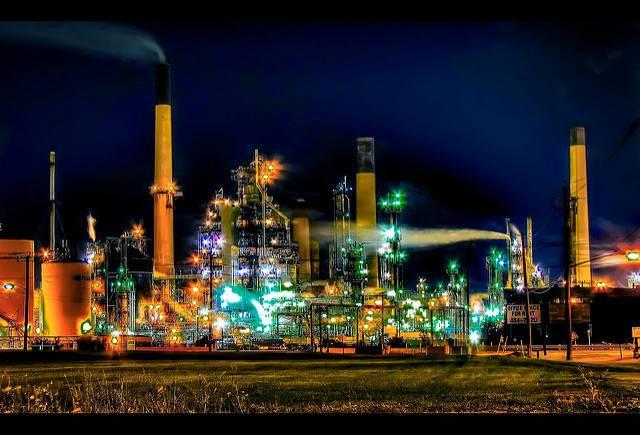
In what is often called a "2⁰C world," falling demand for oil means that a quarter of the world's refining capacity may not be necessary by 2030.
At least, that is the assessment offered by Carbon Tracker, a London-based think tank that studies the impact of the global energy transition on capital markets. The group partnered with the Danish pension fund PKA and Swedish pension fund AP7 on this report, Margin Call: Refining Capacity in a 2⁰C World.
Carbon Tracker's researchers analyzed 492 refineries, which combined account for 94 percent of the world's total oil capacity. The think tank says its study is likely the first analysis that gauges how the energy sector would perform as governments and companies scramble to meet international objectives to limit climate change to 2°C by ramping up investments in clean energy and technology.
Earlier this year, Carbon Tracker issued a study saying that electric vehicles (EVs) and solar could displace oil and coal by as soon as 2020. And therein lies why oil companies face long-term threats to their business: Carbon Tracker's staff concluded that oil companies may be grossly underestimating the rapid growth and scale of electric vehicles, which could comprise one-third of the global transportation market by 2035.
The global oil and gas industry has long been bullish on its future prospects, due largely to expected growth in emerging economic powerhouses such as China and India. But the specter of Asian megacities rife with polluting fossil fuel-powered cars has recently been displaced by an altered vision of cities still suffering from even more traffic in the future - but largely due to electric cars.
Hence the problem of stranded assets that oil companies' refineries could face in the coming years. Generally, refineries account for about 25 percent of the assets on oil companies’ ledgers. These facilities are valued at tens of billions of dollars and are critical to these energy companies' profitability. But Carbon Tracker's 2˚C scenario modelling found that over the next two decades, many of these companies' profits could crater. Total and Eni are the oil companies most exposed, as they could suffer a 70 to 80 percent drop in their refineries' earnings as worldwide demand decreases. Shell and Chevron also could face a decline ranging from 60 to 70 percent; ExxonMobil and BP could see their earnings fall by as much as half by 2035.
So despite a growing global middle class and population growth, Carbon Tracker insists the convergence of EVs and renewables means that oil companies are most likely beyond their halcyon days. Under this 2˚C scenario, this group's researchers conclude there is plenty of capacity to meet future energy demands. Furthermore, Carbon Tracker warns investors that overall and with few exceptions, the world has no need to add additional refinery capacity.
Andrew Grant, a senior analyst at Carbon Tracker who co-authored the report, envisions many energy companies leaving this market in the years ahead. "Many players will exit the market rather than hemorrhage cash. Investors should beware that the risk of wasting capital extends to all new investments, including expansions or upgrades to existing facilities," said Grant.
Image credit: Jeff S. PhotoArt/Flickr

Leon Kaye has written for 3p since 2010 and become executive editor in 2018. His previous work includes writing for the Guardian as well as other online and print publications. In addition, he's worked in sales executive roles within technology and financial research companies, as well as for a public relations firm, for which he consulted with one of the globe’s leading sustainability initiatives. Currently living in Central California, he’s traveled to 70-plus countries and has lived and worked in South Korea, the United Arab Emirates and Uruguay.
Leon’s an alum of Fresno State, the University of Maryland, Baltimore County and the University of Southern California's Marshall Business School. He enjoys traveling abroad as well as exploring California’s Central Coast and the Sierra Nevadas.














